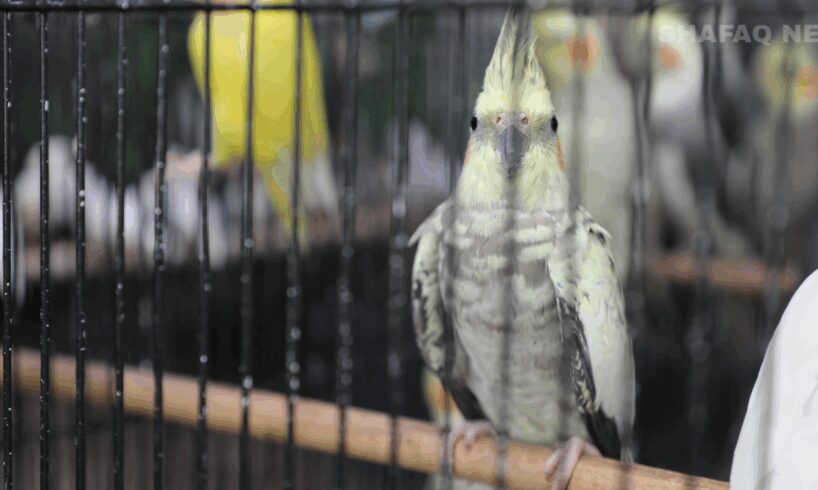
Shafaq News
In a country where urban stress and societal tension often weigh heavily
on daily life, many Iraqi families are turning to an unexpected source of
comfort: the melodic chirping and vibrant plumage of ornamental birds. The
trend, once considered a niche hobby for collectors and older enthusiasts, is
now gaining wide popularity among mothers, children, and even those living
alone. The shift is more than decorative — it’s psychological.
Living Symphony
“I didn’t expect birds to bring this much happiness into our house,”
said Israa Sahib, a mother of four in Baghdad. Speaking to Shafaq News, she
recounted how her children insisted on having birds after seeing homing pigeons
at a relative’s home. “I chose smaller ornamental birds because they’re easier
to tame, don’t need rooftop towers like pigeons, and stay quietly in their
cages. They’ve made our home feel alive.”
She described the transformation in her household: “Their colors, their
songs — they brought joy to the kids, and their happiness made me happy too.”
This sentiment is echoed across Baghdad’s famed Ghazil pet market, where
bird sellers display a dazzling array of species: parakeets, lovebirds
(including the brightly colored rosy-faced species), finches like the
zebra-striped zebrata, melodious canaries, and sleek cockatiels — all more
popular now than the traditional homing pigeon.
From Pigeons to Pets
The pigeon, once a cultural icon across Iraqi rooftops, has faded in
popularity, especially among younger and urban residents. A bird seller in the
Ghazil market told Shafaq News, “Mothers, kids, teenagers — they all want
ornamental birds now. Pigeons still have their loyal followers, mostly older
men or professionals, but they’re less practical for today’s homes.”
He added that homing pigeons carry many drawbacks: “They’re noisy, they
leave droppings on rooftops and balconies, and they require space to fly and
training to return.” Iraq’s growing urban density and shrinking household space
have only accelerated the shift toward smaller, indoor-friendly species.
Prices for ornamental birds range from as little as 5,000 Iraqi dinars
(under $4) to 150,000 dinars for imported canaries or jumbo species, making
them accessible to a wide range of Iraqis.
Emotional Companionship
For many, these birds are more than a visual delight. They become
companions.
Ahmed Majid, a bachelor living in a small apartment in Baghdad, told
Shafaq News, “I live alone, and the birds give me peace. When I come back from
work, I feel like someone is waiting for me.” He said their presence helps
relieve the isolation and stress of solitary urban life. “They distract me,
comfort me. I don’t feel alone anymore.”
Psychologist Manahel Al-Saleh explained this phenomenon, noting, “Many
people find emotional relief in raising birds. These creatures are gentle and
responsive — people feel they share their emotions, especially those who live
alone.”
She added that for some owners, the relationship with the birds becomes
deeply personal, “Some believe the birds sense their moods — joy, anger,
sadness — and respond accordingly. This deepens the human–bird bond.”
According to Al-Saleh, the attraction stems from the birds’ role as
living, responsive beings that evoke calm. “In a chaotic world, people look for
softness and peace. The birds’ movements and chirping absorb stress and relax
the mind.”
Growing Hobby
While no official statistics are available, anecdotal evidence from
market sellers and pet supply vendors suggests the number of bird owners in
Iraq has steadily increased since the 1980s — when choices were mostly limited
to parrots and canaries. Today’s enthusiasts have access to a wider range of
species, including cockatiels, goldfinches, and hybrid breeds imported from
abroad.
What’s driving the surge? Sellers point to a mix of affordability,
aesthetic value, and the therapeutic effect birds have on their owners.
Psychological studies globally support what Iraqi families are
experiencing anecdotally. The act of caring for birds — feeding, observing,
listening to them — is known to promote mindfulness, reduce anxiety, and
increase feelings of connectedness.
In Iraq, where communities continue to recover from conflict,
displacement, and economic uncertainty, this growing hobby offers not just
recreation, but a subtle, quiet form of emotional healing.
As Al-Saleh put it, “Sometimes, healing comes not through words, but
through the flutter of wings and a soft, persistent song.”
Written and edited by Shafaq News staff.





